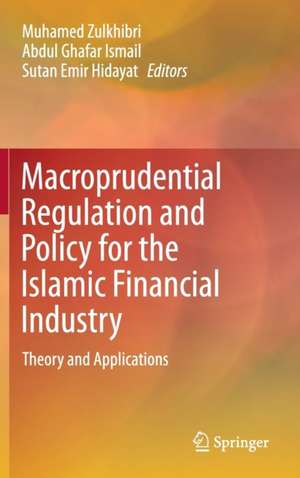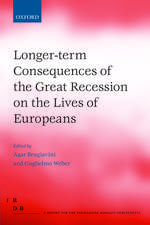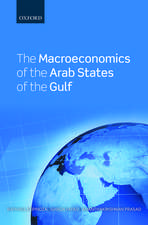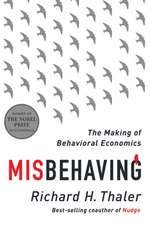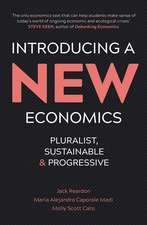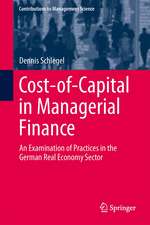Macroprudential Regulation and Policy for the Islamic Financial Industry: Theory and Applications
Editat de Muhamed Zulkhibri, Abdul Ghafar Ismail, Sutan Emir Hidayaten Limba Engleză Hardback – 2 iun 2016
Macroprudential policyis increasingly seen as a way of dealing with the different dimensions ofsystemic risk. But many central banks, bank supervisors and regulators havelimited experience with macroprudential tools, particularly in the Islamicfinancial industry. Given the complementarities between monetary policy andfinancial stability, it appears that central banks would always play animportant role in macroprudential policy. But how should macroprudential policybest interact with monetary policy? It is becoming more pressing for the centralbanks to conduct monetary policy in which its conventional banking systemoperates side by side with Islamic banking system. This question has receivedincreasing attention in the research literature but there is much we still needto learn. This is why new insights from research on macroprudential policy –which has gained important impetus in recent years – are so valuable. Featuringcontributions on topics such as macroprudential regulation, policy, tools andinstruments; governance, systematic risk, monetary policy, and bank leverage,the editors provide a collection of comprehensive research covering the mostimportant issues on macroprudential policy and regulation for the Islamicfinancial industry. This volume is expected to be a significant contribution tothe literature in the field of Islamic finance and evaluation of publicpolicies to promote the development for Islamic financial industry. It is alsoserved as a key text for students, academics, researchers, policy-makers in thefield of Islamic finance.
| Toate formatele și edițiile | Preț | Express |
|---|---|---|
| Paperback (1) | 640.06 lei 43-57 zile | |
| Springer International Publishing – 30 mai 2018 | 640.06 lei 43-57 zile | |
| Hardback (1) | 646.30 lei 43-57 zile | |
| Springer International Publishing – 2 iun 2016 | 646.30 lei 43-57 zile |
Preț: 646.30 lei
Preț vechi: 760.35 lei
-15% Nou
Puncte Express: 969
Preț estimativ în valută:
123.67€ • 129.45$ • 102.93£
123.67€ • 129.45$ • 102.93£
Carte tipărită la comandă
Livrare economică 31 martie-14 aprilie
Preluare comenzi: 021 569.72.76
Specificații
ISBN-13: 9783319304434
ISBN-10: 3319304437
Pagini: 256
Ilustrații: XII, 272 p. 34 illus., 32 illus. in color.
Dimensiuni: 155 x 235 x 18 mm
Greutate: 0.58 kg
Ediția:1st ed. 2016
Editura: Springer International Publishing
Colecția Springer
Locul publicării:Cham, Switzerland
ISBN-10: 3319304437
Pagini: 256
Ilustrații: XII, 272 p. 34 illus., 32 illus. in color.
Dimensiuni: 155 x 235 x 18 mm
Greutate: 0.58 kg
Ediția:1st ed. 2016
Editura: Springer International Publishing
Colecția Springer
Locul publicării:Cham, Switzerland
Cuprins
Part I. Institutional Framework for Macroprudential in Islamic Banking System.- 1. Macroprudential Policy and Regulation in A Dual Banking System: An Exploratory Perspective.- 2. Doctrinal Challenge for Islamic Banking on Macroprudential Regulations: A Religion-Regulation Mismatch 2.0.- 3. Conceptual Proposal for Future Macroprudential Framework under Dual Financial System in Indonesia.- Part II. Macroprudential Policy, Systemic Risks and Financial Stability in Islamic Financial Industry.- 4. Risk Management Methodologies: An Empirical Macro-prudential Approach for a Resilient Regulatory Framework for the Islamic Finance Industry.- 5. Competitive Condition and Market Power of Islamic and Commercial Conventional Banks in Indonesia.- 6. Early Warning Indicators and Macroprudential Policy Tools.- 7. A Proposed Formula for Reserve Requirement–Financing to Deposit Ratio: The Case of Islamic Banking in Indonesia.- 8. Testing of the Procyclicality of Islamic and Conventional Banks in Indonesia.- 9. Short-Term Liquidity Management Mechanisms in the Absence of Islamic Interbank Loan Markets.- Part III. Experiences in Implementing Macroprudential Policy in a Dual Banking System.- 10. Macroprudential Analysis of Financial Crisis Impacts on Banks’ Soundness: Evidence from Pakistan.- 11. Regulatory Framework for Islamic Finance: Malaysia’s Initiative.- 12. Islamic Finance and Macroprudential Policy: The Case of Iranian Banking System.- Part IV. Interplay between Macroprudential Policy with Other Markets.- 13. Indonesia Shari’ah Compliance Stock Index Responses towards Macroprudential and Monetary Policy of Indonesia Central Bank.- 14. Socio-Economic Development and its Effect on Performance of Islamic Banks: Dynamic Panel Approaches.- 15. Macroprudential Tools and Its Relationship withMonetary Policy Tools.
Notă biografică
Dr. Muhamed Zulkhibriis a Senior Economist at Islamic Research and Training Institute, IslamicDevelopment Bank, Saudi Arabia with years of progressive experience in theCentral Bank of Malaysia and policy-oriented institutions. He involved indeveloping countries partnership strategy, undertaken research projects and advisoryworks with other development and policy-oriented institutions globally. He has authored extensively on Monetary Economics, Financial Institutions and Markets,Finance and Economic Development, Islamic Economics and Finance, with more than80 research articles in leading academic journal, regulatory publication,industry report and the financial press. Hehas been invited to speak at many international conferences and he has lecturedfor under- and post-graduate program at the University of Nottingham, U.K andUniversity Putra Malaysia. He earned a Ph.D in economics from University ofNottingham, United Kingdom.
Dr. Abdul Ghafar Ismail isthe Head of Research division, Islamic Research and Training Institute, IslamicDevelopment Bank and a professor of banking and financial economics at theUniversity Kebangsaan Malaysia. He is on leave from Schoolof Economics, University Kebangsaan Malaysia. He has been lecturing at theuniversity since 1987 on economics and finance courses such as money andbanking, financial economics, advanced macroeconomics, Islamic economics system,money and capital market in Islam and international finance; Islamic banking;money, zakat and the real economy; risk management in Islamic banking; Islamicfinancial management. His specialization is in the area of Islamic economicsand finance. He has a Ph.D in economics from the University of Southampton,United Kingdom.Dr. Sutan Emir Hidayatis the Head of Business Administration Department at University College ofBahrain, Bahrain. He has presented research papers at reputable international conferencessuch as the IRTIconferences, the GRM 2012, University of Cambridge, U.K, the11th Harvard University Forum on Islamic Finance, USA. He was also invited tospeak at AAOIFI-World Bank Annual Conference and MEIF 2015. He has alsopublished research papers in international journals and become a reviewer forthe IMEFM, Emerald and Review of Financial Economics, Elsevier. He also hascontributed chapters in four books. He is an Islamic finance journalistregularly publishes articles in Islamic Finance News. During his academiccareer, he has supervised and examined 32 Master Theses. Recognizing hiscontribution, he has been listed and awarded by ISFIN in Islamica 500 as one ofthe top 50 most influential people to the Islamic economy in 2015 on a globalscale.
Dr. Abdul Ghafar Ismail isthe Head of Research division, Islamic Research and Training Institute, IslamicDevelopment Bank and a professor of banking and financial economics at theUniversity Kebangsaan Malaysia. He is on leave from Schoolof Economics, University Kebangsaan Malaysia. He has been lecturing at theuniversity since 1987 on economics and finance courses such as money andbanking, financial economics, advanced macroeconomics, Islamic economics system,money and capital market in Islam and international finance; Islamic banking;money, zakat and the real economy; risk management in Islamic banking; Islamicfinancial management. His specialization is in the area of Islamic economicsand finance. He has a Ph.D in economics from the University of Southampton,United Kingdom.Dr. Sutan Emir Hidayatis the Head of Business Administration Department at University College ofBahrain, Bahrain. He has presented research papers at reputable international conferencessuch as the IRTIconferences, the GRM 2012, University of Cambridge, U.K, the11th Harvard University Forum on Islamic Finance, USA. He was also invited tospeak at AAOIFI-World Bank Annual Conference and MEIF 2015. He has alsopublished research papers in international journals and become a reviewer forthe IMEFM, Emerald and Review of Financial Economics, Elsevier. He also hascontributed chapters in four books. He is an Islamic finance journalistregularly publishes articles in Islamic Finance News. During his academiccareer, he has supervised and examined 32 Master Theses. Recognizing hiscontribution, he has been listed and awarded by ISFIN in Islamica 500 as one ofthe top 50 most influential people to the Islamic economy in 2015 on a globalscale.
Textul de pe ultima copertă
This volume aims to discuss thecurrent research, theory, methodology and applications of macropreudentialregulation and policy for the Islamic financial industry. Published incooperation with the Islamic Research and Training Institute (IRTI), this book featurescontributions from a workshop presented in collaboration with the UniversityCollege of Bahrain (UCB) in Manama, Bahrain, aimed to bring together experts inIslamic banking and regulation and financial economics. This resulting booksheds light on how macroprudential policy may be implemented in the Islamicfinancial system, and indicates current challenges and their effects oneconomic growth, financial stability and monetary regulation.
Macroprudential policyis increasingly seen as a way of dealing with the different dimensions ofsystemic risk. But many central banks, bank supervisors and regulators havelimited experience with macroprudential tools, particularly in the Islamicfinancial industry. Given the complementarities between monetary policy andfinancial stability, it appears that central banks would always play animportant role in macroprudential policy. But how should macroprudential policybest interact with monetary policy? It is becoming more pressing for the centralbanks to conduct monetary policy in which its conventional banking systemoperates side by side with Islamic banking system. This question has receivedincreasing attention in the research literature but there is much we still needto learn. This is why new insights from research on macroprudential policy –which has gained important impetus in recent years – are so valuable.
Featuringcontributions on topics such as macroprudential regulation, policy, tools andinstruments; governance, systematic risk, monetary policy, and bank leverage,the editors provide a collection of comprehensive research covering the mostimportant issues on macroprudential policy and regulation for the Islamicfinancial industry. This volume is expected to be a significant contribution tothe literature in the field of Islamic finance and evaluation of publicpolicies to promote the development for Islamic financial industry. It is alsoserved as a key text for students, academics, researchers, policy-makers in thefield of Islamic finance.
Macroprudential policyis increasingly seen as a way of dealing with the different dimensions ofsystemic risk. But many central banks, bank supervisors and regulators havelimited experience with macroprudential tools, particularly in the Islamicfinancial industry. Given the complementarities between monetary policy andfinancial stability, it appears that central banks would always play animportant role in macroprudential policy. But how should macroprudential policybest interact with monetary policy? It is becoming more pressing for the centralbanks to conduct monetary policy in which its conventional banking systemoperates side by side with Islamic banking system. This question has receivedincreasing attention in the research literature but there is much we still needto learn. This is why new insights from research on macroprudential policy –which has gained important impetus in recent years – are so valuable.
Featuringcontributions on topics such as macroprudential regulation, policy, tools andinstruments; governance, systematic risk, monetary policy, and bank leverage,the editors provide a collection of comprehensive research covering the mostimportant issues on macroprudential policy and regulation for the Islamicfinancial industry. This volume is expected to be a significant contribution tothe literature in the field of Islamic finance and evaluation of publicpolicies to promote the development for Islamic financial industry. It is alsoserved as a key text for students, academics, researchers, policy-makers in thefield of Islamic finance.
Caracteristici
Presents the current academic and policy research, theory, methodology and applications of macroprudential regulation and policy in the Islamic financial industry Features contributions from a workshop presented by Islamic Research and Training Institute (IRTI) in collaboration with University College of Bahrain (UCB) in Manama, Bahrain Provides a collection of comprehensive research covering the most important issues and challenges on macroprudential policy and regulation for the Islamic financial industry Includes supplementary material: sn.pub/extras
